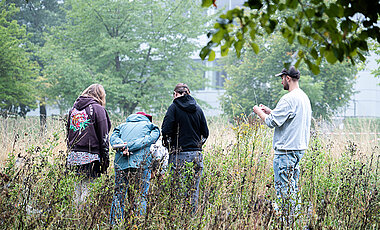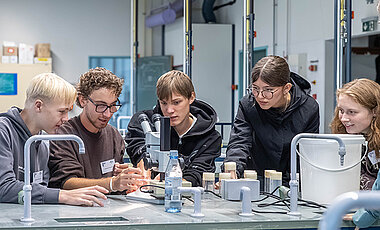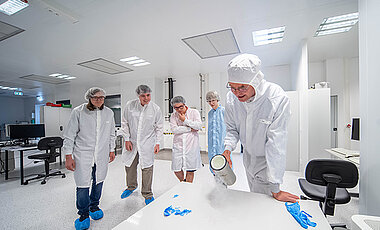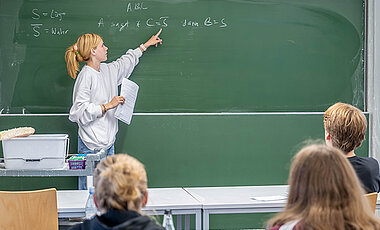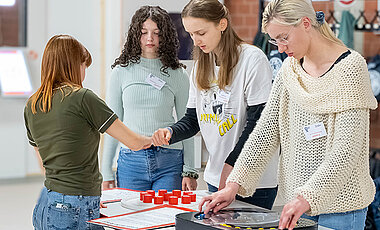Research, Marvel, Join in: the STEM Summer Schools
09/23/2025Around 140 pupils from all over Germany took part in the STEM summer schools on the campus of the University of Würzburg. A scientific discovery space opened up to them.
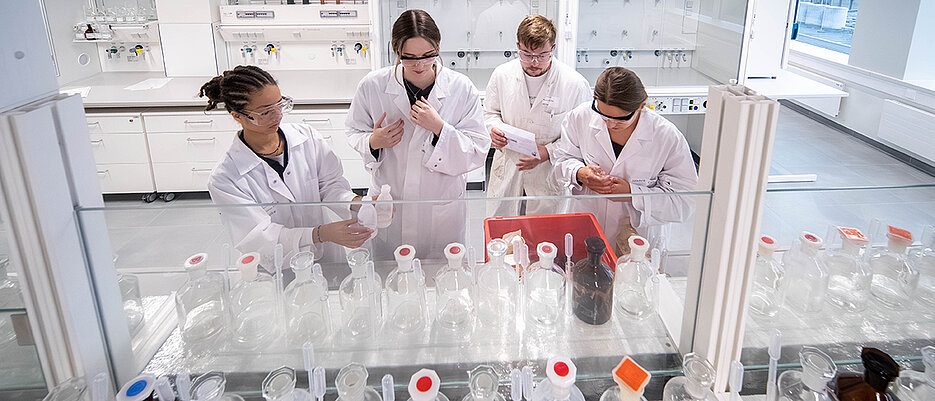
At the STEM summer schools from 8 to 12 September 2025, participants were able to experience science up close - from microscoping individual nerve cells to collecting and identifying insects to tricky mathematical tasks. A week full of research spirit and teamwork showed the pupils that science is exciting, tangible - and also really entertaining.
Crawling on Campus - Hands-on Biology
With landing nets and ground traps, the pupils of the Biology Summer School travelled across the Hubland campus - and were amazed at how many different animals and plants live right next to the university buildings. Under the motto "Wildlife in the city", they tracked down earthworms, spiders and other crawling campus inhabitants. They categorised the insects they collected under the microscope and investigated their roles in the ecosystem.
"The summer school aims to provide insights into our subject and introduce students to career fields," says Nadja Simons, Junior Professor of Applied Biodiversity Research at the Faculty of Biology. "With us, they get to know the breadth of biology - with lots of practical exercises."
Back in the lab, the summer school students used high-resolution fluorescence microscopy to visualise nerve cells that are a thousand times thinner than a hair. They learnt how science uses bacteria for medicine, nutrition and environmental protection and produced their own microscopic specimens. Plant research also provided exciting experiments - from analysing the scent of flowers to molecular biology research questions.
"Friends told me about the STEM summer schools - that sounded interesting. We signed up straight away and are glad that it worked out," says sixth form student Cosima, who travelled from Frankfurt with three classmates and is holding a jar with a beetle she caught herself. "We were curious to find out what studying biology is like - and I can well imagine studying here because I really like the university."
Chemistry - a Journey of Discovery Into the Subject
"We want to take young people on a journey of discovery through our subjects without pressure and according to their previous knowledge," explains Dr Daniel Bellinger, research assistant at the Faculty of Chemistry and Pharmacy. "And we want them to enjoy experimenting."
To this end, he and his colleagues have packed boxes full of equipment and materials. Bunsen burners, glass flasks and other items were ready and waiting in the brand new laboratories of the practical training building on the Hubland campus. Equipped with lab coats and safety goggles, the pupils set to work in small teams, experimenting independently, trying out their own solutions and gaining a lively insight into the world of chemistry - for example, when extracting essences from fruit. They quickly realised that chemistry is not just theory, but a lively, practical field of research.
"My biology teacher actually drew my attention to the STEM summer schools, but I signed up for chemistry after all," says Leonard, a pupil from Neustadt an der Aisch. He likes the group work - and also the modern equipment in the labs. "I was particularly impressed by the experiments we did this week in the absence of air. I can well imagine studying here!"
In addition to independent laboratory work, seminars provided insights into topics such as materials science, which play a key role in modern processes such as 3D printing. The mixture of theory and practice also impressed sixth form student Sophia from Stuttgart: "I love science! And the chemistry summer school programme sounded really good," she says as she puts on her white lab coat. She can also well imagine studying in Würzburg: "The city is very beautiful and the university is modern."
Physics: Black Holes and Pins
In physics, the students immersed themselves in processes in the universe as well as in the smallest structures down to individual atoms. Lectures, experiments and visits to exhibitions made complex systems comprehensible and showed that physics is not only found in textbooks, but is at work everywhere around us.
"I saw a poster about the STEM summer schools at my school in Bamberg - and signed up straight away," says Paul. "I like the atmosphere here at the university! I also liked the cafeteria food," says the Bamberg native. "And the lecturers were very open-minded towards us."
The practical side of the programme included building stable bridges out of paper and exploring the physical principles of magnetic resonance imaging. A special highlight was the visit to the electron microscopes in the clean room: here, the students were able to look at individual atoms and engrave the STEM summer schools logo on a pin.
Participants were also able to get hands-on in the Touch Science exhibition. "This is our hands-on science exhibition," says Dr Markus Elsholz, Managing Director of the MIND Centre at JMU, "where we offer a playful approach to physical phenomena and relationships that also play a major role in our everyday lives, such as magnetism and heat radiation."
Maths - Best in a Team!
The maths summer school was also all about taking part: escape room puzzles, magic cubes and tricky logical thinking tasks were all part of the programme. At the same time, the young people learnt how maths is used in medicine, for example in calculating the radiation dose for computer tomographs.
The highlight was the Matboj competition: the students worked in groups to solve demanding mathematical challenges, presented their solutions to the other teams and faced critical questions from the competition. Each team was able to put forward alternative approaches, while a jury of experts scrutinised the results and awarded points for correct solutions.
In the end, it was clear that mathematics thrives on logical thinking, creative solutions and a lot of cooperation, which Dr Theresa Lechner also emphasises: "We show pupils what mathematics looks like at university - from the basics to very current research topics such as machine learning. In this way, we provide early guidance on choosing a degree programme," says the research assistant at the Institute of Mathematics. "It's also particularly important for us to show that maths is teamwork - something that many people don't even know from school."
Exploring University Life in the Community
In addition to workshops and lectures, the STEM summer schools also offered pure campus life and allowed pupils to slip into the role of students for a week. Rallies across the university campus, barbecues together and many encounters with scientists and students made the university seem approachable. For many of the young people, it was their first intensive encounter with life at the university - and an opportunity to try things out in a new community.
The high level of interest showed that the natural sciences are inspiring. The places were already taken before the programme began, and there were also waiting lists. At the end of the week, the young people not only took home many new impressions, but also the realisation of how diverse and exciting studying at JMU in Würzburg can be.
STEM Summer Schools - Support From Many Sides
The success of the STEM Summer Schools would not be possible without the great commitment of the participating institutes and their staff. With a great deal of time, commitment and professional expertise, they offered the pupils an exciting programme full of experiments, workshops and shared experiences.
This year's summer schools were once again supported by the Mapara Foundation, the Wilhelm and Else Heraeus Foundation and the Society of German Chemists - their funding contributed significantly to the visitors from all over Germany experiencing an unforgettable week at JMU.
Additional images
